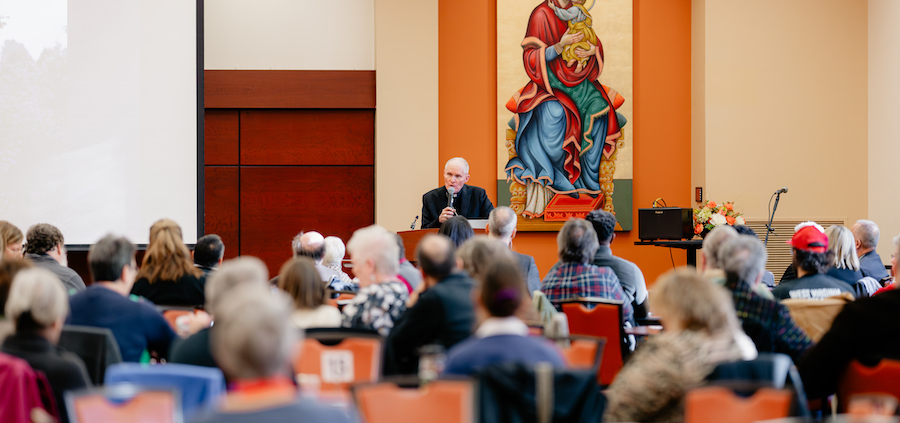“The Dream of the Mountains’ Struggle”: Faith and Labor Leaders Meet for Dialogue on Appalachia by Michael Centore
This Land Is Home to Me, a pastoral letter on powerlessness in Appalachia, was issued by the Catholic bishops of the Appalachian region in 1975. The letter was the result of a year’s worth of synodal-style conversations between the Catholic Committee of Appalachia and area residents, who reflected on their experiences of economic precarity, environmental degradation, and dehumanization under the dominance of corporate wealth.
As Tricia Pyne points out in her entry on the letter for The West Virginia Encyclopedia, This Land Is Home to Me was unique in its use of poetic imagery and the free-verse style in which it was composed. Rereading it today, one can sense a new template for ecclesial documents that harks back to the ancient linkages between poetry and prophecy while addressing issues pertinent to our time.
Across three parts—“The Land and Its People,” “The Answer of Jesus and His Church,” and “Facing the Future”—the document unfolds in short, prosaic lines interspersed with staccato-like bursts of bulleted lists, as in this excerpt from a subsection of part I entitled “Defending the Struggle’s Dream”:
There are too few spaces of soul
left in our lives.Once we all
- knew how to dance and sing
- sat in mystery before the poet’s spell,
- felt our hearts rise to nature’s cathedral.
Now an alien culture
battles to shape us
into plastic forms
empty of Spirit,
into beasts of burden without
mystery.
On Saturday, October 25, 150 faith and labor leaders from across Appalachia gathered at the Diocese of Pittsburgh Pastoral Center in Pittsburgh, Pennsylvania, to honor the letter’s 50th anniversary as well as the 10th anniversary of Pope Francis’s encyclical on the environment, Laudato Si’.
The event was billed as a “faith and labor dialogue on the environment and the future of Appalachia” and went under the name A Healthy Future for This Land. It was convened by three Catholic bishops with ties to the region: Most Rev. Mark Eckman (Diocese of Pittsburgh); Most Rev. Mark Brennan (Diocese of Wheeling-Charleston); and Most Rev. David Zubik (Bishop Emeritus of the Diocese of Pittsburgh).
Speakers included Angela Ferritto, President of the Pennsylvania AFL-CIO, and Sister Helen Skormisley, CSJ, member of the leadership team of the Congregation of St. Joseph in Wheeling, West Virginia. Ms. Molly Linehan-Belcher of the Catholic Committee of Appalachia chaired the event, which featured a performance by musician Tom Breiding.
According to the press release, “A core part of the event was reflecting on personal experiences in a process known as synodal dialogue, ushered in by Pope Francis.” This linked the event back to the conversational method that first informed the drafting of This Land Is Home to Me. Delegates to the dialogue included “grassroots Appalachian Catholics” alongside priests, deacons, religious sisters, and diocesan staff.
The synodal dialogues focused on the generational intrusion of corporate power throughout the region and the resulting environmental damage. One example is the estimated 300,000 abandoned oil and gas wells polluting communities throughout Pennsylvania. Event delegate Paul Lemmon, policy director for Union Energy, said, “It’s obvious to everyone that we should clean up these wells that are poisoning us. That’s where the faith community could be a game changer—by helping us reach into our hearts to do the right thing for our children and for God’s creation.”
Lonnie Ellis of In Solidarity, a Catholic communications nonprofit that assisted the bishops in convening the event, summarized the day as follows: “The 150 leaders from Appalachia commemorated the past, but mostly we looked to the future and made big strides in rebuilding the Catholic Church-labor partnership, starting with an emphasis on protecting the environment and workers.”
Ellis pointed to the “powerful statements” of the event’s speakers, such as Bishop Brennan’s call to “raise our voices and start boycotts” against companies that abuse workers and the environment and “put human beings below the profit of the few.” Brennan wove references to Saint Pope John Paul II’s pro-union encyclical Laborem Exercens into his remarks.
In harmonizing the spirit of This Land Is Home to Me with the environmental ethics of Laudato Si’, Saturday’s dialogue seems to have accomplished an aggiornamento of sorts—a “bringing up to date” of the 1975 pastoral letter in alignment with the era of climate change and financialization of the global economy. Recommendations from the letter, such as the suggestion to establish “Centers of Reflection and Prayer” that “integrate / the analytical social science skills / and the profound spirituality / necessary for preserving creativity / in the struggle for justice” are remarkably prescient and should be revisited alongside the concluding lines, which sing with a prophetic lyricism sorely needed in our church communiques today:
The dream
of the mountains’ struggle,
the dream
of simplicity and of justice,
like so many other repressed visions
is, we believe,
the voice of The Lord among us.In taking them up,
hopefully the Church
might once again
be known as
- a center of the Spirit,
- a place where poetry dares to
speak,- where the song reigns
unchallenged,- where art flourishes,
- where nature is welcome,
- where little people and little
needs come first,- where justice speaks loudly,
- where in a wilderness of
idolatrous destruction the great
voice of God still cries out for
Life. ♦
Michael Centore is the editor of Today’s American Catholic.





Leave a Reply
Want to join the discussion?Feel free to contribute!